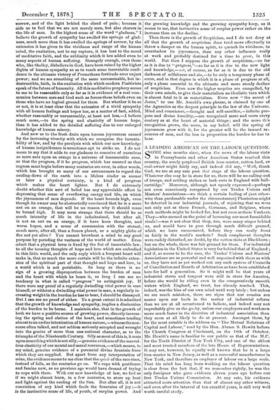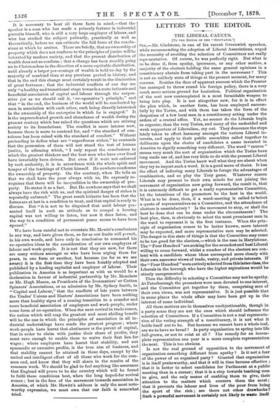A LEADING AMERICAN ON THE LABOUR QUESTION.
SOME nine months since, when the news of the labour riots in Pennsylvania and other American States reached this country, the sorely perplexed British iron-master, cotton lord, or coal-owner might fairly say, and indeed did say, " Well, thank God, we are at any rate past that stage of the labour question. Whatever else may be in store for us, there will be no calling-out of troops, and settling strikes or lock-outs in England with ball- cartridge." Moreover, although not openly expressed—perhaps not even consciously recognised by our Trades Unions and Masters' Associations—we think a certain feeling of (not other- wise than pardonable under the circumstances) Pharisaism might be detected in our industrial journals, of rejoicing that we were not only not as these French, Germans, and Belgians, where such methods might be looked for, but not even as these -Yankees. They—who seemed on the point of becoming our most formidable rivals !—was it not clear that they, too, were many stages behind us, and would have to pass through much difficult ground, which we have surmounted, before they can really front us fairly in the world's markets ? Such complacent thoughts were rudely disturbed, no doubt, by the cotton riots at Blackburn ; but on the whole, there was fair ground for them. For industrial legislation in the United States is very far behind that of England ; and if, as seems to be the case, the Trades' Unions and Masters' Associations are as powerful and well organised with them as with us, they have not as yet worked out any such system of Councils of Conciliation and Boards of Arbitration as have been established here for half a generation. So it might well be that years of industrial storm and tempest were still in store for America, before she would be riding even in the comparatively smooth waters which England, we trust, has already reached. This, indeed, was the bias of our own mind until very lately ; but unless we are much mistaken, there arc signs that our cousins are nearer upon our heels in the matter of industrial reform than we are at all accustomed to believe, and indeed may not improbably give us the go-by, unless our employers and workmen move much faster in the direction of industrial association than they seem at all likely to do at present. Amongst these, by far the most notable is the address on " The Mutual Relations of Capital and Labour," read by the Hon. Abram S. Hewitt before the Church Congress at Cincinnati, on the 18th of October. Mr. Hewitt's name is familiar to our public as that of the M.C. for the Tenth District of New York City, and one of the ablest and most trusted members of the late House of Representatives. It may not, however, be equally well known that he is a large iron-master in New Jersey, as well as a successful manufacturer in New York, and therefore an employer of labour on a large scale. That his mind has long been working on the labour question is clear from the fact that, if we remember rightly, he was the only foreigner who gave evidence eleven years ago before our first Trades Unions Commission. At any rate, his evidence attracted more attention than that of almost any other witness, and even after the interval of ten eventful years, is still very well worth careful study.
It is necessary to bear all these facts in mind,—that the speaker is a man who has made a princely fortune in industrial pursuits himself, who is still a very large employer of labour, and who has studied the subject patiently, practically as well as theoretically, before we can estimate the full force of the conclu- sions at which he arrives. These are briefly, that no ownership of property which does not conform to the principles of justice will be tolerated by modern society, and that the present distribution of wealth does not so conform ; that a change has been steadily going on in Christendom in the direction of a more equitable distribution, until already a larger per-tentage of wealth is held to-day by the majority of mankind than at any previous period in history, and that in the end this change must certainly result in the diminution of great fortunes ; that the industrial conflicts of our day are only "a healthy and transitional stage towards a more intimate and beneficial association of capital and labour through the corpor- ative (or as we should call it, ' co-operative ') principle," and that " in the end, the business of the world will be conducted by men in association with each other, each being directly interested in the ownership of the enterprise in which he is engaged." It is the unprecedented growth and abundance of wealth during the present century which has raised the questions which are stirring society to its foundations. The conflict is more intense now, because there is more to contend for, and " the standard of con- science has been raised with the standard of comfort." Without pretending to define what are "superfluous riches," he contends that the possession of them will not stand the test of human justice, in affirming which, " I only repeat the conclusions to which the greatest thinkers and the best men who have ever lived have invariably been driven. But even if it were not enforced by such authority, it is in accordance with the whole spirit and temper of the teachings of Christ himself. He nowhere condemns the ownership of property. On the contrary, when He tells us that we shall have the poor always with us, He expressly re- cognises that there will be inequalities in the ownership of pro- perty. He states it as a fact. But He nowhere says that we shall always have the rich with us, and the spiritual danger of riches is repeatedly enforced." The great result hitherto has been that the forces are at last in a condition to treat, and that capital is ready to discuss. But "it is not to be disguised that until labour pre- sented itself in such an attitude as to compel a hearing capital was not willing to listen, but now it does listen, and the way to a condition of permanent peace seems to have been opened."
We have been careful not to overstate Mr. Hewitt's conclusions in any way, and have given them, so far as our limits will permit, in his own words, and have only in conclusion to commend his co-operative ideas to the consideration of our own employers of labour and work-people. It is not that they are new, for there are many writers amongst us who have been urging them for years, in one form or another, but because (so far as we are aware) it is the first time they have been frankly adopted and published by a leading capitalist and employer of labour. Their publication in America is as important as with us would be a declaration in favour of industrial partnership by Mr. Menelaus or Mr. Hugh Mason, as Presidents of the Ironmasters' or Cotton Spinners' Associations, or an admission by Mr. Sydney Smith, in " Capital and Labour," that the conflicts of late years between the Trades' Unions and Masters' Associations have been nothing more than healthy signs of a coming transition to a sounder and more beneficial association of employers and work-people, under some form of co-operation. When the next revival in trade comes, the nation which will reap the greatest and most abiding benefit will be the one in which the principles of association in all in- dustrial undertakings have made the greatest progress ; where work-people have learnt that abstinence is the parent of capital, that in order to claim with justice their share of profits, they must save enough to enable them to waive their first lien for wages ; where employers have learnt that stability, and not spasmodic or excessive profits, is the true aim of business, and that stability cannot be attained in these days, except by the united and intelligent effort of all those who work for the com- mon end, and know that they will share in the results of the common work. We should be glad to feel anything like assurance that England will prove to be the country which will be found to fulfil these conditions best, when the long hoped-for revival comes ; but in the face of the movement towards association in America, of which Mr. Hewitt's address is only the most note- worthy expression, we must own that our faith is somewhat tried.







































 Previous page
Previous page